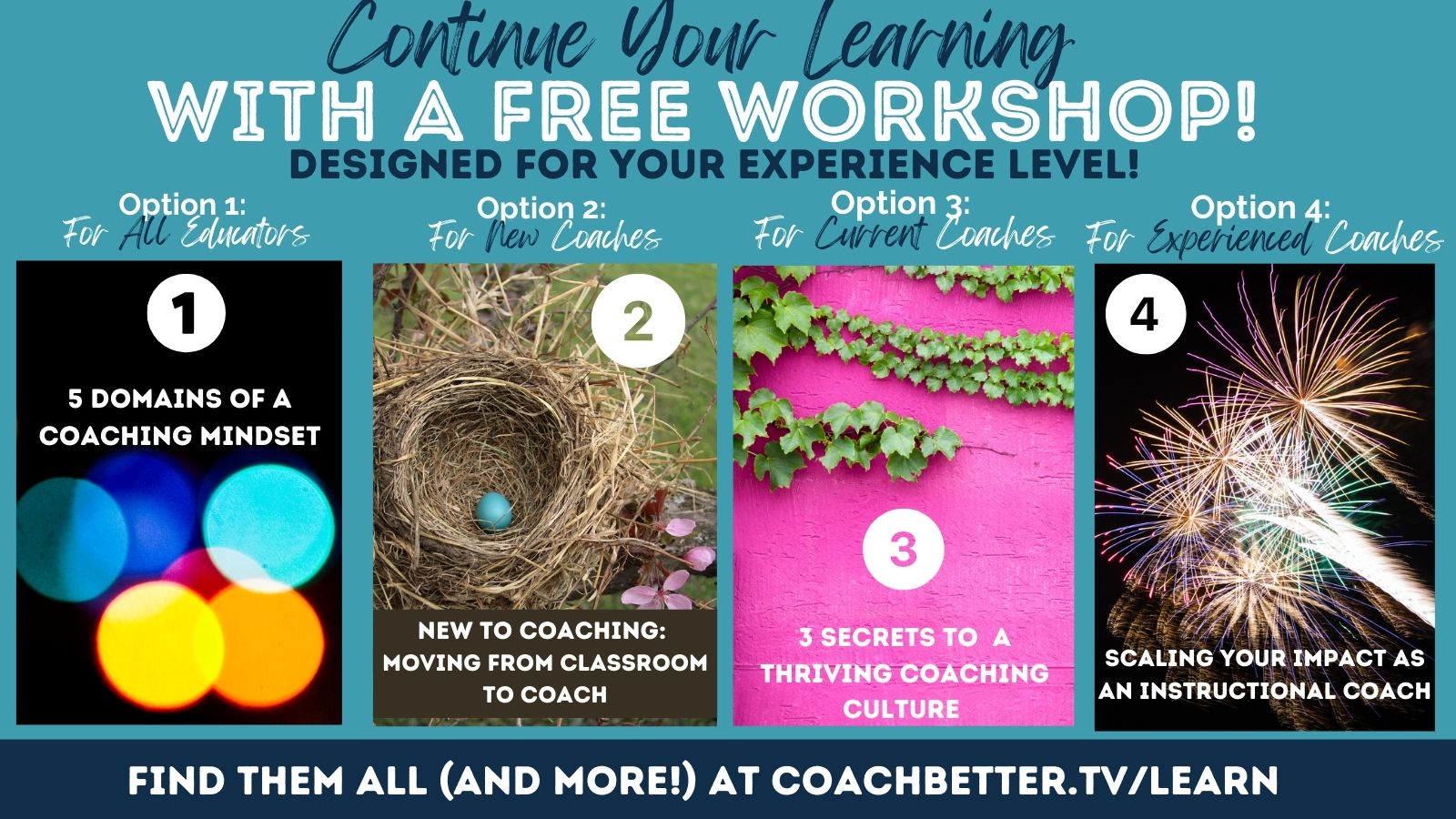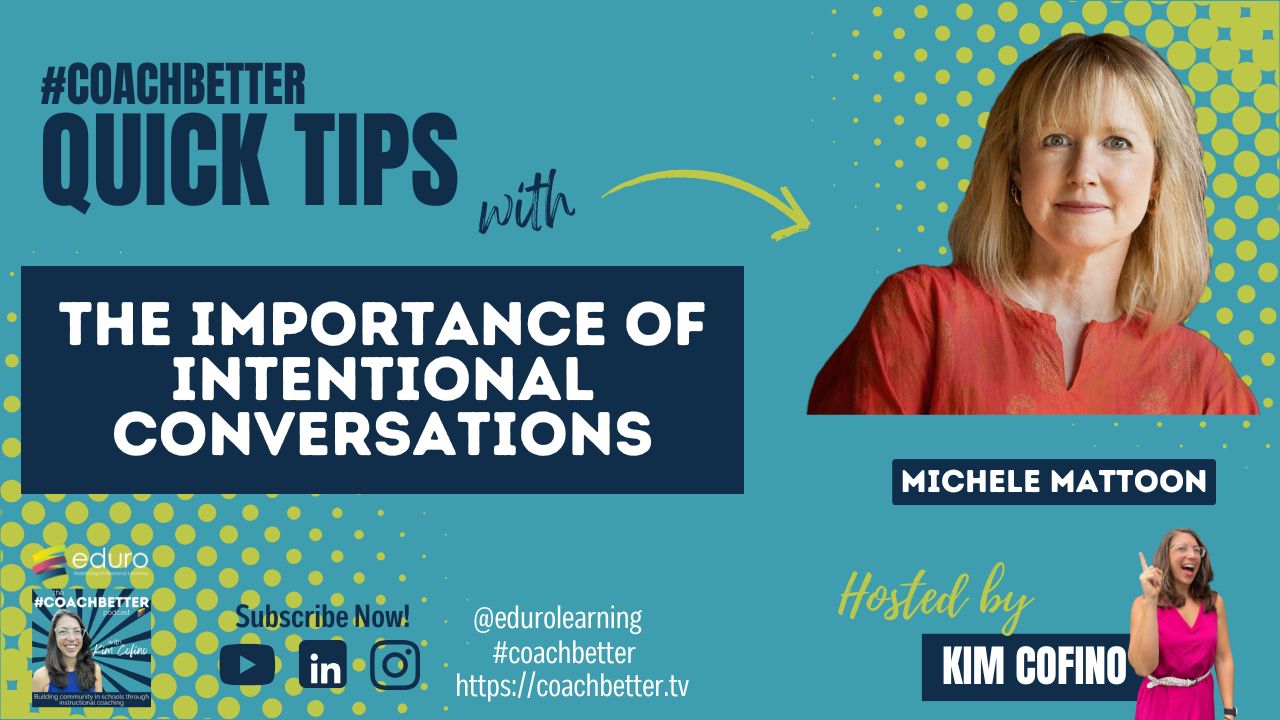As coaches, we’re often asked to facilitate professional conversations.
Sometimes it full PD sessions with a whole division, sometimes it’s small group conversations.
No matter what size of group I’m working with – I have one strategy I use all the time.
Do you use protocols in your coaching practice?
This blog post will share exactly why you should – and when it’s best to use them!
Recently as part of one of AAICIS Leaders Speaker Series we had Jennifer Abrams share with our community about Stretching Your Learning Edges (Jennifer has also been a guest on the podcast if you want to check out that episode), and as she said on the podcast, Jennifer highlighted how as educators we are not trained in having conversations with other adults.
Having intentional and structured conversations, through the use of protocols, can really help us navigate difficult and challenging topics that, as Michele says, sometimes need “guardrails”.
Because instructional coaches work with so many different stakeholders, with so many different perspectives, experiences and opinions, it’s so important for us to know how to structure conversation for productive discourse and dialogue. Protocols are one way we can do that.
If protocols are new to you, make sure to check out the full episode with Michele. Once you start using protocols in your professional learning, and group conversations, you won’t go back.
In this episode, we’ll learn why this kind of structure is so important!
What’s YOUR level of coaching mastery?
All coaches go through various stages of coaching mastery. Once you identify where you’re at, you can begin to build the skills needed to move to the next stage.
This quiz is based on real-life case studies compiled from years of working with coaches inside The Coach Certificate & Mentorship Program!
When you receive your results, you’ll also get your matching case study from the STRIVE Case Studies to see where you fit in the stages of coaching mastery.
Ready to tackle your challenges and move on to the next level in YOUR coaching practice?

The STRIVE Model of Coaching Mastery quiz will help you identify your level of coaching mastery by matching you with case studies compiled from years of working with coaches inside The Coach Certificate & Mentorship Program so you can easily see where you fit!
When you complete the quiz, you’ll get:
- Your matching case study,
- Specific strengths & challenges aligned to your result;
- Suggested next steps for each stage;
Plus the Case Study Document includes:
- Case studies leveled by coaching mastery;
- A framework to identify essential stages of professional growth & key areas to focus on in your professional learning;
- Alignment with the THRIVE Model for a Successful Coaching Culture;
- Space for you to reflect & prioritize so you can take action immediately!
You’ll go straight to the Quiz, and get the Case Studies by email.
Why and When to Use Protocols
Michele says…
We can’t solve our problems with the same thinking we used when we created them.
It doesn’t come naturally to human beings to have a structured conversation. We don’t do that well.
When people are first exposed to a protocol, they often say “it just didn’t feel natural”. My response is “good, we don’t want it to be natural because if we keep doing what we naturally do, we will still get to the same result that got us into this situation.”
Michele Mattoon
Structuring conversations is incredibly important when we do certain things. If you don’t need a protocol, please don’t use one.
If you use it when you don’t need one, it teaches people that there’s useless confining structure that doesn’t give them anything.
Protocols are useful when you…
- have a certain amount of time
- want to get something done,
- want to hear every voice in the room.
Using protocols sets a culture, so everyone knows what to expect. The more you use them, the deeper you can go.
If this post resonates with you, please make sure to listen to the full episode. Protocols really are a wonderful pathway to so many different types of conversations.
As instructional coaches we are facilitating conversations all the time – with small groups, with teams, in large scale professional learning. To be able to ensure that those experiences meaningfully engage all participants, we need structure for our conversations.
Leading professional learning, and facilitating these types of conversation is a huge part of our role as instructional coaches. No matter how many experiences we have, we can always do a little bit better.
That’s why leading professional learning & structures for facilitating conversations are included in ALL of our courses for coaches – at the level that’s right for your experience.
Watch the Video
Free Workshops for Instructional Coaches
If you’re ready to keep learning, try one of our FREE workshops where you’ll be able to dig deeper into the concepts in this post, and get a peek at all of our courses for coaches.
We have workshops (and courses) to support coaches at every stage of their career: from educators curious about coaching, to new and aspiring coaches making the move from classroom to coach; to current coaches ready to be more intentional and strategic in their practice; to established coaches leveraging their coaching experience to lead.

You can them all on our coachbetter website at coachbetter.tv/workshops
If you’re curious right now, you have questions, please reach out. You can leave a comment below, join our #coachbetter Facebook group, or find us on social media at Eduro Learning and send me a DM. I’d love to support you on your coaching journey. See you next time!
Connect with us!
Subscribe to the podcast iTunes |Spotify|Stitcher
Follow us on social media: Instagram |LinkedIn
Join our #coachbetter Facebook group

Recent Comments